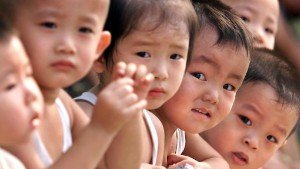The Chinese government could be moving to end birth restrictions, amid growing concerns over an aging population and a dropping birth rate.
Under current family planning rules, the majority of Chinese couples are limited to two children, following an easing of the country's notorious "one-child policy" in 2016. These restrictions now look set to be further relaxed under a new draft reform to the country's Civil Code, potentially allowing families to have multiple children for the first time in decades.
According to a brief statement released Tuesday by the National People's Congress, the new revised code "will no longer retain the relevant content of family planning."
The revised code won't be completed until March 2020 and there is no indication yet how exactly the change would be made, or whether any other restrictions or conditions might remain on Chinese families.
But a change to the country's strict family planning laws had been considered likely by experts for some time.
"The government will lift the policy, to what degree they then go further with pre-natal policy is another issue, but I think they'll lift the policy in the foreseeable future," Therese Hesketh, professor at the University College London's Institute for Global Health, told CNN.

Giving birth 'a national issue'
Worries over a falling birth rate had led Beijing to announce in October 2015 it would no longer mandate Chinese couples only had one child, ending policy that for decades has been blamed for infanticide and forced sterilizations.
Instead, parents were allowed and even encouraged to have up to two children. An opinion piece titled "Giving birth is a family matter and a national issue" was published on August 6 in the overseas edition of People's Daily, mouthpiece of the ruling Chinese Communist Party.
But the changes failed to produce a spike in the birth rate. In 2017, the country's total fertility rate was 1.6 children per woman, well below the 2.1 rate estimated to be necessary to keep the population steady.
"Relaxing the One Child policy actually didn't lead to an immediate jump in births, which the government was kind of predicting and counting on," Human Rights Watch senior researcher Maya Wang told CNN.
"So now the Chinese government has come around to the opinion as well they need to further relax their control and abolish the birth controls altogether."
CNN contacted China's National Health Commission, which oversees the country's family planning, for comment on the story.
Aging population
The Chinese government is concerned it could soon be running out of workers as the effects of the country's long-standing One Child policy begin to hit home.
The infamous policy was originally introduced in 1979 over concerns by the Communist Party leadership that the population would soon spiral out of control.
However several decades on, the family planning policy has left a shrinking pool of young people left to support their aging parents and grandparents.
"Especially in cities, the cost of having children is getting higher and higher. From birth to school, economic costs and time costs are rising," said the People's Daily opinion piece in August. "Many young people living in cities are not willing to have children."
Since the policy was implemented, the proportion of the population aged over 65 has risen from about 4% to almost 10%.
Given the worrying factors, experts had long considered a push to remove the limits on child births likely. Some even saw the issuing of a Year of the Pig stamp for 2019, featuring two adult pigs with three happy piglets, as a sign the Communist Party was preparing to move.
A similar stamp issued in 2016 for the Year of the Monkey featured two baby monkeys kissing their parent and was seen as a tribute to the dropping of the One Child policy.
"It is possible they may (introduce) gentle, pro-natal policies like we have in most countries around the world ... like proper paid maternity leave for longer and cheap or free kindergartens," Hesketh, the UK health professor, told CNN.
The One Child policy
If the change of policy is confirmed, it will mark the end of one of China's most controversial policies in its modern history.
Following its introduction the policy was an unqualified success, dropping the total fertility rate in China from about six births per female in the 1960s to less than two by the 2000s.
But critics say the methods by which it was accomplished were often brutal. Women living under the policy described forced abortions, heavy fines, and eviction from homes if they attempted to have a second baby.
The policy had worrying consequences for the gender balance as a desire for male children led to reported abortions and infanticide to ensure a couple's only child was a boy.
As a result, in 2016, there were 1.15 males for every female in China, one of the most skewed gender ratios in the world.
Wang of Human Rights Watch said while the Chinese government and its supporters viewed the policy as "painful but necessary," it had been an "affront to basic Chinese culture."
"I think every family in China has been touched by the family planning policy, every Chinese family can tell you about the mother, or aunt, or uncle, who had been forcibly aborted or given away," she said.
Wang said although the policy might have ended, there has been no accountability for the "abuses" that occurred during its implementation.
Source: https://edition.cnn.com/2018/08/28/asia/china-family-planning-one-child-intl/index.html
Hi! I am a robot. I just upvoted you! I found similar content that readers might be interested in:
https://ktla.com/2018/08/28/china-moves-to-end-2-child-limit-amid-concerns-over-aging-population/
Downvoting a post can decrease pending rewards and make it less visible. Common reasons:
Submit